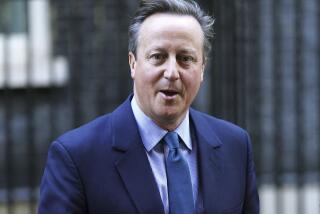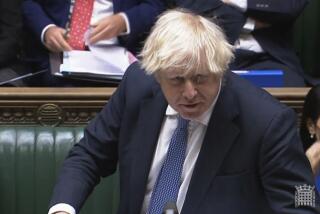British Order Expulsion of 6 More Soviets
- Share via
LONDON — Prime Minister Margaret Thatcher’s government today ordered the expulsion of six more Soviets, two of them diplomats, in an escalating diplomatic confrontation sparked by the defection of the KGB’s top operative in this country.
It was the third move in a round of tit-for-tat expulsions that began Thursday when Britain ousted 25 Soviet diplomats, journalists and trade officials. The Foreign Office said the 25 were named as spies by Oleg A. Gordievski, whom the office identified as the KGB spy chief in Britain.
Gordievski defected and was granted asylum in Britain.
The Soviets responded Saturday by expelling an equal number of British diplomats, journalists and businessmen.
‘Unjustified Response’
The Foreign Office said today’s expulsions were in retaliation for what it called “a totally unjustified response to the British government’s expulsion of Soviet personnel who had been actively engaged in intelligence activities designed to undermine the national security of the United Kingdom.”
A Foreign Office statement said the Soviet charge d’affaires, Lev A. Parshin, was told today that the six Soviets must leave the country by Oct. 7 and that the overall ceiling on the number of Soviet officials in Britain will be reduced from 211 to 205.
The latest deportees are a first secretary at the Soviet Embassy, Yevgeniy Ilich Safronov, 37; assistant air attache Col. Victor Aleksandrovich Mishin, 42; two embassy clerks, Victor Vasilyevich Daranov and Aleksander Ivanovich Yerokhin, both 40; the director of Anglo-Soviet Shipping, Ivan Ivanovich Vikulov, 47, and a correspondent for the Soviet press agency Novosty, Sergey Aleksandrovich Volovets, 47.
Summoned for Talk
Parshin was summoned to the Foreign Office by Derek Thomas, political director, who informed him of the additional expulsions.
Parshin left the Foreign Office after a 25-minute talk with Thomas. He looked grim and refused to comment.
Before Parshin was called to the Foreign Office, Thatcher held two separate meetings with her foreign minister, Sir Geoffrey Howe, and Home Secretary Douglas Hurd to discuss the Soviet move.
Thatcher had faced the choice between living up to her reputation as an “Iron Lady” and risking a further escalation in the expulsion war by ordering out more Russians, or adopting a more diplomatic approach.
The response announced today was seen as a sign that she had convinced Foreign Secretary Howe of the need to continue a tough line.
More to Read
Sign up for Essential California
The most important California stories and recommendations in your inbox every morning.
You may occasionally receive promotional content from the Los Angeles Times.













